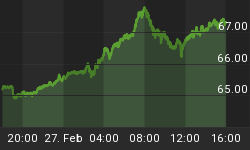Mario's Sledgehammer

On June 4, we hypothesized the bullish key to the June 5 ECB statement was getting a mention of quantitative easing (QE). Did the bulls get what they were looking for? Yes, they did. From Bloomberg:
"Mario Draghi is taking a sledgehammer to the disinflationary environment in the eurozone," said Chad Morganlander, a fund manager at Stifel Nicolaus & Co., which oversees $160 billion, from Florham Park, New Jersey. "His actions are well beyond expectations." ECB President Mario Draghi reduced the deposit rate to minus 0.1 percent from zero, making the institution the world's first major central bank to use a negative rate. Policy makers lowered the benchmark rate to 0.15 percent from 0.25 percent. In a bid to get credit flowing to parts of the economy that need it, the ECB also opened a 400-billion-euro ($542 billion) liquidity channel tied to bank lending and officials will start work on an asset-purchase plan. A worsening in the euro area's economic outlook and a prolonged spell of slow inflation prompted the ECB to act to preserve the fragile recovery in the world's second-largest economy.
Tepper's Mid-May Comments
Right, wrong, or indifferent, investors often make changes based on sound bites. For example, successful hedge fund manager David Tepper had some cautionary words on May 14. From CNBC:
"I'm not saying go short, I'm just saying don't be too fricking long right now,"
Notice what Tepper said versus what many people wanted to hear. He basically said "it is not a bad time to reduce and manage equity risk." What many people incorrectly heard was "I am bearish."
Despite Bearish Calls By Many, Stocks Push Higher
Unlike Tepper, who spoke of risk management, others have made outright bearish calls. Below are headlines that appeared over the last few weeks:
Calm Before The Storm
Time To Sell This Stock Market? Two Pros Think So
Stocks Are Telling You A Bear Market Is Coming
With the S&P 500 up again this week, it may be time to ask yourself a difficult question:
Have any of the bearish prognosticators helped anyone over the past few months?
Tepper Delivers A Bullish Sound Bite
While the ECB was a big driver of Thursday's 12 point advance in the S&P 500, David Tepper also played a role. From CNBC:
Widely followed hedge fund manager David Tepper told CNBC on Thursday his chief market concerns have "alleviated." Those views changed. "Bottom line is, all of those things alleviated, one by one by one to a certain extent," Tepper said in a phone call to CNBC.
The Evidence Was Mixed, Not Bearish
Just as Tepper's cautious remarks from a few weeks ago were twisted into bearish ammunition, use of words, such as vulnerable, are often misinterpreted. We regularly point out that vulnerable does not mean bearish. We shared Tepper's concerns in mid-May; in fact we penned an article titled Is A Stealth Bear Market Already In Motion one day after Tepper's "don't be too fricking long" statement. We closed out the May 16 piece with a warning about anticipating any outcome in the markets:
In June 2008, a clear shift took place calling for a reduction in equity exposure. In 2009, a clear and decisive shift took place in favor of stocks. The terms "clear" and "decisive" do not apply to the present day battle between bonds and stocks. Therefore, until more convincing evidence surfaces, we will continue with a prudent mix of stocks (VTI), bonds (TLT), and cash. When will we shift one way or another? Answer: when the observable evidence changes, which is quite a bit different than saying when we "anticipate" or "forecast" that it will change.
Does Paying Attention Help?
While we acknowledged on May 16 that there were numerous things to be concerned about there was not enough hard evidence in hand to warrant leaving the stock market altogether. The dated and equity-friendly comments from May 16 can be found here. Similar "things still look good" comments were made on May 30, allowing us to participate in the 62 point move in the S&P 500 since May 16.
Investment Implications - Incremental Improvement
Have things improved since May 16? Yes, not only has the ECB opened the door to quantitative easing, but the observable evidence has improved considerably, which is why we have been adding to the growth side of our portfolios in recent weeks. One example of improvement can be seen on the chart of the S&P 500 below. The recent bullish breakout has held thus far, which aligns with an improving aggregate opinion of future economic outcomes and earnings.

Given the potential for inflation with the ECB keeping things ultra loose and the current weight of the evidence, we incrementally reduced our fixed income exposure (TLT) Thursday. Reduced does not mean eliminated. If the market's profile does not change significantly before the close Friday, we will consider making another in a series of incremental bumps to increase the growth (SPY) side of our allocations.
Bulls Have Employment Hurdle To Cross
Are the bulls out of the woods with a favorable ECB statement and more favorable Tepper comments in hand? No, the always-obsessed-about monthly labor report is on deck. Never a dull moment.















